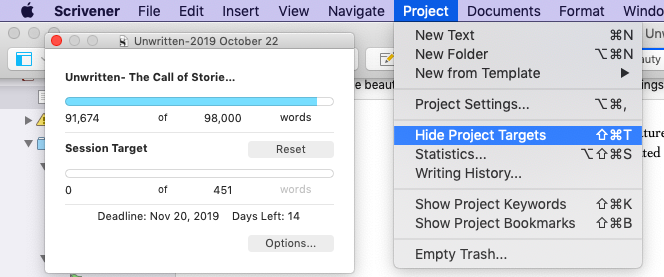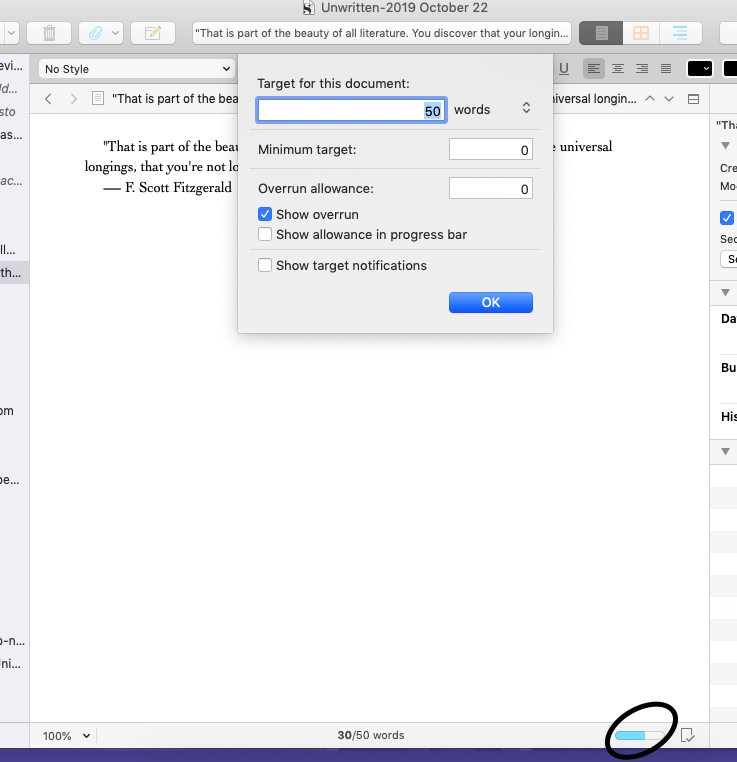Writing in the Cracks: Targets and Alerts in Scrivener
- Alicia J Novo

- Jul 23, 2019
- 3 min read
Writing everyday is often-repeated advice. How to leverage technology to help you.

To be a writer, one must write. But given the pressures of daily life, for many, writing every day may seem out of reach.
One solution? Revise your expectations and develop a daily target. Writing to targets is not only a smart practice but a motivating one.
Does it seem impossible still?
Start small. Keep going down in your expected word count until you reach a number that makes you smile at the lie of its being unachievable.
I've read somewhere of a famous author who wrote his novels 350 words at a time. People reported seeing him forever with a notebook into which he would scribble from time to time.
Most of us are less adept at writing in the cracks, in the odd ends of life. We long for continuous periods to immerse ourselves into a story and let words flow. And like anyone who's been interrupted by a toddler eight times an hour will know, the Start-Stop takes productivity out of any process. Life isn't perfect, though, and six-hour stretches aren't lying around in everyone's routine. Most of us are jugglers. So exercising the skill of writing in the cracks is vital.
Writing in the cracks is the best way for most of us to keep making progress.
Daily Writing and Counting your Wins.
The trick is to set targets you can reach and meet them--Keeping in mind that accomplishing them is more important than the actual word count. Because as writers, discouragement is our worst enemy.
So write to your target and celebrate your accomplishments. A scene, a chapter, a particular story point. Because the journey is long, reveling in small successes inures you against crippling doubt and keeps you away from the abyss of writer's block.
An achievable daily target is an excellent antidote for discouragement.
Is the most you can write 250 words? Fair enough. That's a Win. Keep at it, and at the end of a year, you will have 90k words. A full novel. Not anything to scoff at.
A caveat: Try to be realistic and honest at the start. Changing and re-changing your goals can be counterproductive. Look hard in the mirror before setting your targets.
TECHNOLOGY HACK
Everyone who's met me will tell you I'm a Scrivener fan (note: I'm not connected with the company in any way, but they ought to pay me a commission). I love the tool. And I keep recommending it. I'm planning another post on all the reasons why, but here I want to focus only on the target feature and how it can support your daily writing practice.
Scrivener Targets and Alerts
In Scrivener, you can set a target for your manuscript, establish a due date, and specify on which days you plan to write. You have the option to either calculate a target based on the progress required to complete the manuscript by the due date or provide a set number. For the purpose of the daily target discussion, simply un-click the automatic calculation option and enter your desired word count.
Alerts/ Target notifications will warn you that a new session has started and will reward you with an appreciative sound once you've met your goal. You can configure the time at which the session resets based on your writing habits.
A note for plotters
Scrivener also allows you to set a target word count for every document, including an overrun allowance. This comes in handy to ensure particular scenes don't go too long, that you have the correct amount of scenes and other similar uses in the arsenal of the control-freak. If you are a plotter, you'll learn to cherish this feature.
Visual tracking at the bottom right corner will illustrate how far you've come, and the bar turns green when your document's goal has been met.
As always, if technology can help, use it. Never let it sidetrack or rule you.
Slow and steady wins
In short, I highly recommend you to try the daily writing challenge, and if you do, make sure to leverage Scrivener. You will leave your computer with a sense of accomplishment every time the Goal Complete alert dings, and you will be chipping away at your project almost without noticing.
Dare, always. Keep writing.

















Comments